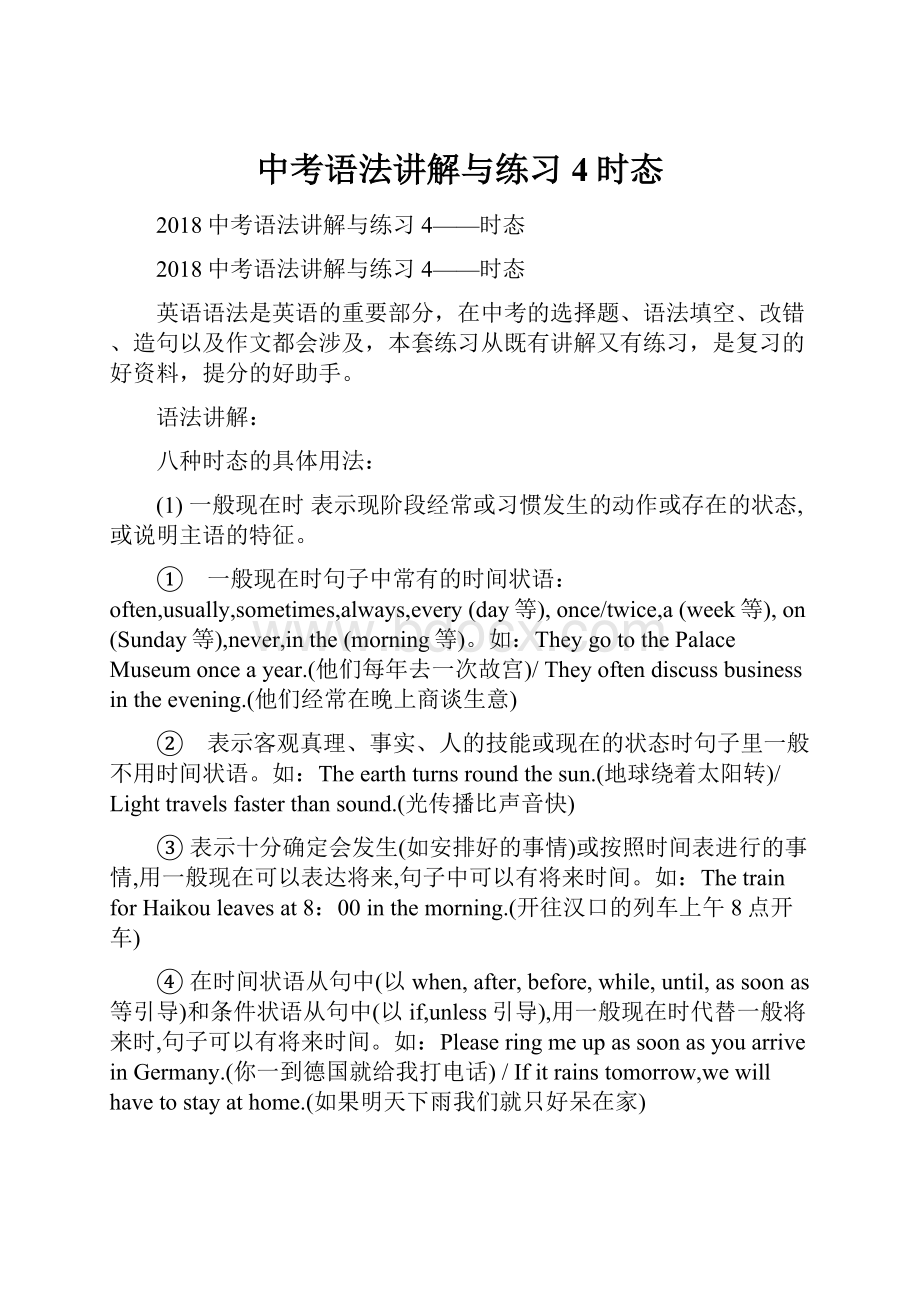中考语法讲解与练习4时态.docx
《中考语法讲解与练习4时态.docx》由会员分享,可在线阅读,更多相关《中考语法讲解与练习4时态.docx(15页珍藏版)》请在冰豆网上搜索。

中考语法讲解与练习4时态
2018中考语法讲解与练习4——时态
2018中考语法讲解与练习4——时态
英语语法是英语的重要部分,在中考的选择题、语法填空、改错、造句以及作文都会涉及,本套练习从既有讲解又有练习,是复习的好资料,提分的好助手。
语法讲解:
八种时态的具体用法:
(1)一般现在时表示现阶段经常或习惯发生的动作或存在的状态,或说明主语的特征。
① 一般现在时句子中常有的时间状语:
often,usually,sometimes,always,every(day等),once/twice,a(week等),on(Sunday等),never,inthe(morning等)。
如:
TheygotothePalaceMuseumonceayear.(他们每年去一次故宫)/Theyoftendiscussbusinessintheevening.(他们经常在晚上商谈生意)
② 表示客观真理、事实、人的技能或现在的状态时句子里一般不用时间状语。
如:
Theearthturnsroundthesun.(地球绕着太阳转)/Lighttravelsfasterthansound.(光传播比声音快)
③表示十分确定会发生(如安排好的事情)或按照时间表进行的事情,用一般现在可以表达将来,句子中可以有将来时间。
如:
ThetrainforHaikouleavesat8:
00inthemorning.(开往汉口的列车上午8点开车)
④在时间状语从句中(以when,after,before,while,until,assoonas等引导)和条件状语从句中(以if,unless引导),用一般现在时代替一般将来时,句子可以有将来时间。
如:
PleaseringmeupassoonasyouarriveinGermany.(你一到德国就给我打电话)/Ifitrainstomorrow,wewillhavetostayathome.(如果明天下雨我们就只好呆在家)
⑤一般现在时用于倒装句中可以表示正在发生的动作,动词以come,go为主。
如:
Herecomesthebus.(车来了)/Theregoesthebell.(铃响了)。
⑥一般现在时常用于体育比赛的解说或寓言故事中。
Nowthemidfieldplayercatchestheballandhekeepsit.
⑦人的心理活动和感官动作一般用一般现在时而不用现在进行时表达,常见动词有:
like,love,hate,dislike,want,wish,hope,think(认为),understand,remember,forget,mean,need,hear,feel,see.如:
Ithinkitisgoingtosnow.(我想天要下雪了)/Ireallyhopeyoucanenjoyyourstayhere.(我真的希望你愉快地呆在这儿)
(2)一般过去时表示过去某时发生的动作或状态,这种动作或状态可能是一次性,也可能经常
发生。
① 表示过去具体时刻发生的一次性动作时,时间状语有:
at(eight)(yesterdaymorning),(tenminutes)ago,when引导的时间状语从句。
如:
Igotupat6:
00thismorning.(我是早上六点钟起床的)/LittleTombrokethewindowathalfpastninethismorning.(小汤姆今天早上九点半把窗子打破了)/Whenhewentintotheroom,hesawastrangertalkingwithhisfather.(他走进房间时发现一个陌生人正和他父亲谈话)
② 表示过去一段时间内不知何时发生的一次性动作时,时间状语有:
yesterday,last(year等),in(1998等)。
如:
Hecametoourcityintheyear2000.(他2000年来到我们市)
③ 表示过去一个阶段中经常发生的事情时,时间状语有:
last…,in…,from…to…,for(10years),often,usually,sometimes,always,never等。
如:
MrJacksonusuallywenttoeveningschoolswhenhewasyoung./Everydayhewenttotherichmanandborrowedbooksfromhim.
④ 讲故事、对过去经历的回忆、双方都明白的过去事件等一般用过去时,而且经常省略时间状语。
如:
IhappenedtomeetRoseinthestreet.(我正好在街上遇到露西)
(3)一般将来时表示将来某一时刻或经常发生的动作或状态。
①一般将来时的时间状语有:
tomorrow,this(afternoon),next(year),oneday,now,soon,
someday,sometime,inthefuture,when引导的从句等。
② 用will构成的将来时,表示动作与人的主观愿望无关。
“shall”用于第一人称,“will”
用于所有人称。
如:
Iwillgraduatefromthisschoolsoon.(我很快就要从这所中学毕业了)/YouwillstayaloneafterIleave.(我走了之后你就要一个人过了)
③ “am/is/aregoingto+动词原形”表示打算或准备要做的事情,或者主观判断即将要发生的事情,而“am/is/areto+动词原形”表示安排或计划中的动作。
如:
Amantoldthemthatthewomanwastogivebirthtothespecialbaby.(有一个人告诉他们那个妇女就会生下那个特别的男孩)/It’sgoingtorainsoon.(天快要下雨了)
④ 表示一个人临时决定要做某事,可以用will表达。
如:
Iwillgotothelabtogetsome
chemicals(化学药剂).SopleasewaituntilIreturn.(我要到化学实验室去取些药品,请等我回头)
⑤ 现在进行时、一般现在时也可以表示将来。
(见相应时态)
⑥ shall和will在口语的一些疑问句中相当于情态动词。
Shall一般与第一人称连用,will与第二人称连用。
如:
ShallwegotothezoonextSaturday?
(我们下周六去动物园好吗?
)/Willyoupleaseopenthedoorforme?
(替我把门打开好吗?
)
⑦“beto+动词原形”表示按照计划将要发生的事情。
如:
Anangelcametotellherthatshewastohavethisspecialboy.
(4)现在进行时现在进行时表示现在正在进行的动作或是现阶段正发生而此刻不一定在进行的动作。
①现在进行时由“助动词be(amisare)+现在分词”构成。
②现在进行时的时间状语有:
now,this…,these…等,但经常不用。
如:
Whatareyoudoingupinthetree?
(你在树上干什么?
)/Iamwritingalongnovelthesedays.(我最近在写一本长篇小说)
③表示即将发生的动作,一般指近期安排好的事情。
常见的动词有:
come,go,stay,leave,spend,do等。
如:
I’mcomingnow.(我就来)/Whatareyoudoingtomorrow?
(你明天干什么?
)/Heisleavingsoon.(他就要走了)
④表示频繁发生或反复进行的动作,常与always等频度副词连用,以表示赞扬、不满或讨厌等感情色彩。
如:
Heisalwaysborrowingmoneyfrommeandforgettingallaboutitsometimelater.(他老是向我借钱,过一些时候就忘得一干二净)
(5)过去进行时过去进行时表示过去某一时刻或某阶段正在进行的动作。
①过去进行时由“was(第一、三人称单数)或were(第二人称单数和各人称的复数)+现在分词”构成。
②过去进行时的时间状语有:
then,atthattime,thistimeyesterday,at(eight)yesterday(morning),(ayear)ago,以及由when引出的时间状语从句。
如:
Hewascookingsupperthistimeyesterday.(昨天这个时候他正在做晚饭)/ThelittlegirlwasplayingwithhertoywhenIsawher.(我看到小女孩的时候她正在玩玩具)
③用于宾语从句或时间状语从句中,表示与主句动作同时进行而且是延续时间较长。
句子中通常不用时间状语。
如:
Shewasithappenwhenshewaswalkingpast.(她路过时看到事情的发生)/Theysangalotofsongswhiletheywerewalkinginthedarkforest.(他们在黑暗的森林里走时唱了很多歌)
④也可以表示过去一个阶段频繁发生或反复进行的动作,常与always等频度副词连用,以表示赞扬、不满或讨厌等感情色彩。
如:
Hewasalwaysborrowingmoneyfrommewhenhelivedhere.(他住在这里时老向我借钱)
(6)现在完成时现在完成时表示一个发生在过去的、对现在仍有影响的动作,或表示开始在过去,并且一直延续到现在,甚至还可能延续下去的动作。
①在完成时由“助动词have(has)+动词的过去分词”构成。
②表示发生在过去的对现在仍有影响的动作时,时间状语有:
already,yet,just,once,twice,ever,never,threetimes,before等。
如:
Ihaveneverseensuchfinepicturesbefore.(我以前从来没有看过这么好的画)/HehasjustgonetoEngland.(他刚去英国)
③表示在过去开始一直延续到现在(可能延续下去)的动作或状态时,时间状语有:
for(twoyears),since1990,since(twoweeksago)和since引导的状语从句。
如:
Ihavebeenawayfrommyhometownforthirtyyears.(我离开家乡有30年了)/UncleWanghasworkedinthefactorysinceitopened.(自从这家工厂开张,王叔叔一直在那儿工作)
④口语中havegot往往表示have(有)的意思。
如:
Theyhavegotthousandsofbooksintheirlibrary.(他们图书馆有上万本书)
⑤havebeento与havegoneto的区别:
havegoneto(“已经去了”)表示人不在这里,havebeento(“去过”)表示人在这里。
如:
--WhereisMrLi?
–HehasgonetotheUK.(李先生在哪里?
他去了英国。
)/--DoyouknowsomethingaboutBeijing?
–Yes,IhavebeentoBeijingthreetimes.(你知道北京的情况吗?
是的,我去过那里三次。
)
⑥在完成时中,一个瞬间性动词(一次性动作)不能与表示一段时间的状语连用,此时须将该瞬间动词改为延续性动词或状态动词。
具体变化见下表:
瞬间性动词的完成时
→
延续性动词或状态动词的完成时
have
(already)
goneto…
have
beenin/at…
for(twoyears)
has
cometo…
has
beenhere
since(1990)
(had)
left…
(had)
beenawayfrom…
arrived…
beenin…
died
beendead
begun
beenon
ended
beenover
bought...
had…
borrowed…
kept…
joined…
beenin…
或者使用下面这个句型:
Itis/hasbeen+(多久)+since+主语(人)+谓语(过去时)+……+过去时间状语
[注意]在其它的时态中也存在类似问题,记住,关键是:
瞬间动词不能和表达一段时间的状语连用。
如:
HowlongmayIkeepthebook?
(这本书我能借多久?
)(句子中keep取代了borrow)
(7)过去完成时过去完成时表示过去某一时间或某一动作发生之前已经完成的动作。
简言之,过去完成时所表示的时间是“过去的过去”。
①过去完成时由“助动词had+动词的过去分词”构成。
②过去完成时时间状语有:
by(yesterday),bythen,bytheendof(last…)或者由when,before等引出状语从句。
有时句子中会有already,just,once,ever,never等词语,也会有for…或since…构成的时间状语。
如:
Theyhadalreadyfinishedcleaningtheclassroomwhentheirteachercame.(当老师来的时候他们已经打扫完了教室)/Thewomanhadleftbeforeherealizedshewasacheat.(在他发觉那个妇女是个骗子时她已经走掉了)
③过去完成时常用于宾语从句中、after引导的从句中,或者从句是before引导的主句中。
如:
AfterIhadputonmyshoesandhat,Iwalkedintothedarkness.(我穿上鞋子戴上帽子走进了黑暗之中)/Hesaidthathehadneverseenakangaroobefore.(他说他以前从来没有见过袋鼠)
(8)过去将来时过去将来时表示在过去预计将要发生的动作或存在的状态。
①过去将来时由“助动词should(第一人称)或would(第二、三人称)+动词原形”构成。
在美国英语中,过去将来时的助动词一律用“would+动词原形”。
②过去将来时常由于宾语从句中,时间状语有:
later,soon,thenext(day).
③在时间状语从句和条件状语从句中不可以使用过去将来时,而应该使用一般过去时。
如:
HepromisedthathewouldpaymealotifIhelpedhimwiththeproject.(他答应付给我许多钱如果我帮助他搞那个项目)/Everytimewhenhewasfree,hewouldsitdownandreadsomebooks.(每次只要他有空他就会坐下来看看书)
④表示纯粹的将来时用would或should,表示打算或主观认为的事情用was/weregoingto(+动词原形)。
如:
Shetoldmeshewouldbe18thenextmonth.(她告诉我她下个月就18岁了)/Shetoldmethatshewasgoingtohaveawalkwithherpetdog.(她告诉我她打算带她的宠物狗去散步)
⑤过去将来时还可以表示一个过去经常性的动作。
如:
Whenitrainedintheday,hewouldbringanumbrellawithhim.(白天下雨时他会随身带一把雨伞)
(9)现在完成进行时:
现在完成进行时指一个从过去就开始一直延续到现在并由可能继续下去的动作,它具有现在完成时和现在进行时双重特征,结构是:
“have/has+been+动词的现在分词”。
如:
Ihavebeenswimminginthecoldwaterforabouttwohours.(我已经在冰冷的水里游了将近两个小时)/Howlonghaveyoubeenwaitinghere?
(你在这里一直等了多久?
)
练习1、Thezookeeperisworriedbecausethenumberofvisitors________smallerandsmaller.
A.become B.became
C.isbecoming D.havebecome
2、—Nobodybelieveshe'sread100bookssofar.
—Butinfacthe________.Youcanseethenewsontheschoolwebsite.
A.does B.has C.is D.have
3、—HaveyoureadabookcalledJaneEyre?
—Who________it?
A.writes B.haswritten C.waswriting D.wrote
4、Theteachers________theofficeforafewminuteswhenwearrived.Wedidn'tmeetthem.
A.hadbeenawayfrom B.hadleft
C.havebeenawayfrom D.haveleft
5、—DidyougototheflowershowintheCitySquare?
—No,I________howtomakefoodthen.
A.learn B.learned C.waslearning D.amlearning
6、—IsMr.Greenathome?
—No,he________Shanghai.
A.hasbeento B.hasgoneto C.isgoingto D.hasbeenin
7、—Howcleanthebedroomis!
—Yes,Iamsurethatsomeone________it.
A.cleans B.cleaned C.hascleaned D.hadcleaned
8、They________abouteighthundredEnglishwordsbytheendoflastterm.
A.willlearn B.hadlearned
C.aregoingtolearn D.havelearned
9、—Where'sTomnow?
—He________thepostoffice.
A.hasbeento B.hasgoneto C.wentto D.goesto
10、-Excuseme,lookatthesignNOPHOTOS!
-Sorry,I_________.
A.don'tsee B.didn'tsee C.haven'tseen D.won'tsee
11、-Doyouknowifhe_________toplayfootballwithus?
-Ithinkhewillcomeifhe_________freetomorrow.
A.comes;is B.comes;willbe
C.willcome;is D.willcome;willbe
12、Jackmayfallbehindtheotherstudentsinhisclasswhenhe_________backfrom
Englandnextweek.
A.willcome B.willgo C.goes D.comes
13、—Over100countriesandorganizations_____warmsupporttotheBeltandRoadinitiative(倡议)since2013.
—Wonderful!
Ourcircleoffriendsisgrowingbigger!
A.give B.havegiven C.gave D.willgive
14、—Canyoutellmewhenyouaregoingtoarrivethere?
—I’mnotsure.ButI’llringyouupassoonasI_____theretomorrow.
A.arrive B.arrived C.willarrive D.amgoingtoarrive
15、—MayIborrowyourdictionary,Helen?
—Sorry,it'snothere.Tiny________mydictionaryfortwodays.
A.waskeeping B.keeps C.haskept D.willkeep
16、We inthesameschoolforthreeyears.
A.werestudying B.havestudied C.willstudy D.study
17、 Mr.Miller toShanghaiforavisitassoonasthemeetingisover.
A.goes B.